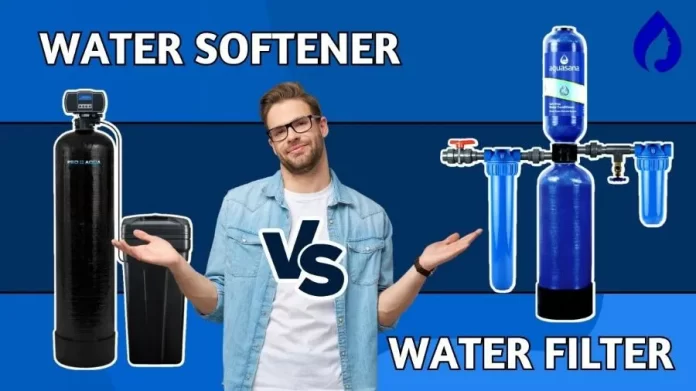Knowing the difference between water softeners and water filtration systems is necessary for anyone looking to improve household water quality. These systems — while serving similar purposes — operate on distinct principles and address separate concerns.
This article will highlight their functions and provide key distinctions between them — assisting you in selecting the appropriate solution for your particular water requirements.
To learn more about the benefits of water softeners, visit this site.
Table of Contents
What is a water softener?
Water softeners are devices made to reduce the hardness of water caused by minerals like magnesium and calcium. This is established through a process called ion exchange — in which hard ions such as calcium or magnesium are exchanged for more pliable ones such as sodium or potassium ions.
Water softeners improve home living in a number of ways.
Reducing scale buildup
Hard water can lead to scale buildup in your pipes and appliances, resulting in reduced efficiency and potential damage. A water softener mitigates this issue by preventing the formation of these mineral deposits.
Enhancing soap efficiency
Soft water allows detergents and soaps to lather better, meaning you require less product for cleaning and bathing. This not only saves you money over time, but it also leads to less soap scum and residue.
Improving skin and hair health
Hard water can often leave your skin feeling dry and your hair lifeless due to the residue it leaves behind. Soft water — on the other hand — can help maintain the natural oils of your skin and hair, promoting overall health and vitality.
What is water filtration?
Water filtration systems are devices designed to purify your drinking water supply by means of physical barriers, chemical processes or biological processes. Filtration technology removes various types of contaminants depending on their application; this ensures it remains safe for consumption and daily use.
Water filtration systems perform many essential functions, such as:
- Removing contaminants: Filtered water systems are designed to remove contaminants such as viruses, bacteria, heavy metals and chemical substances from your drinking water source and improve its flavor and aroma while simultaneously safeguarding you against potential health risks.
- Preserving beneficial minerals: Filtration systems differ from water softeners in that they allow essential minerals like calcium and magnesium to pass through, giving you mineral-rich water for drinking pleasure.
- Environmental sustainability: By filtering tap water, you reduce the need for purchasing bottled water, thereby minimizing plastic waste and contributing to environmental sustainability.
- Improving appliance lifespan: By removing scale-forming ions and other contaminants, water filtration systems can extend the lifespan of household appliances like coffee makers, dishwashers, and washing machines.
- Enhancing overall health: Clean, filtered water is essential for health, aiding in body hydration, nutrient absorption, and toxin elimination. Regular intake of clean water can contribute to improved skin complexion, boosted immunity, and overall wellness.
Water softener vs water filtration: 5 Key differences
When comparing water softeners and water filtration systems, several key disparities arise.
-
Primary function
Water softeners’ primary function is to reduce hardness in water caused by calcium and magnesium ions; on the other hand, water filters aim to filter out contaminants like bacteria, heavy metals, or chlorine from your drinking supply.
-
Treatment process
Water softeners operate on an ion exchange process, where hard water ions are replaced with softer ones. Water filtration systems, on the other hand, use physical, chemical, or biological processes to filter out impurities.
-
Impact on water minerals
Water softeners replace beneficial minerals like calcium and magnesium with sodium or potassium ions, whereas some water filtration systems allow these healthy minerals to remain in the water.
-
Health implications
Water softeners improve skin and hair health by reducing the hardness of the water. In contrast, water filtration systems enhance overall health by removing harmful contaminants and facilitating hydration, nutrient absorption, and toxin elimination.
-
Environmental considerations
Both systems offer environmental benefits. Water softeners contribute by enhancing soap efficiency, requiring less product for cleaning purposes. Water filtrations promote sustainability by reducing reliance on bottled water.
Understanding these differences can guide you in making an informed decision about the best water treatment system for your household based on your specific needs.
















